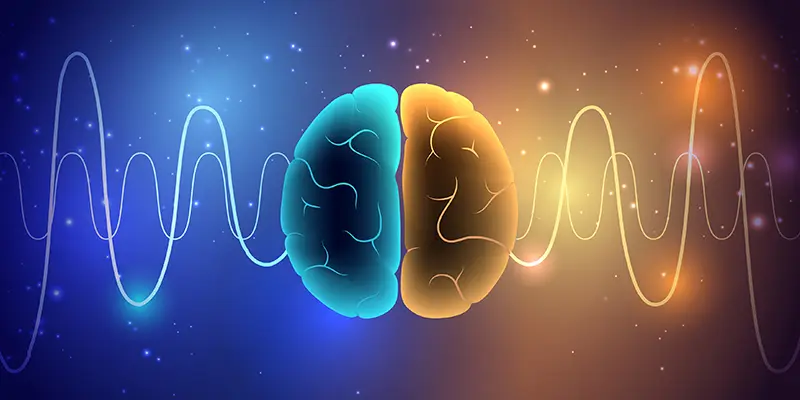
The human brain is the most amazing organ in the universe with billions of neurons communicating with each other every second of every day. To spark this connectivity, rapid electrical impulses stimulate the brain’s neurons into action. The brain is constantly humming with electrical activity, and in fact, it is estimated that the brain generates about 12-25 watts of electricity.
But just like a light bulb can flicker, the brain doesn’t always operate optimally. Emotional trauma, stress, lack of focus, anxiety, depression, memory problems, and more are associated with brain problems. Fortunately, there is a well-researched, non-invasive, medication-free treatment that can help. It’s called neurofeedback, and it allows you to optimize your brain to enhance emotional, behavioral, and cognitive health.
Neurofeedback allows you to optimize your brain to enhance emotional, behavioral, and cognitive health. Click To TweetWHAT IS NEUROFEEDBACK?
Neurofeedback is a type of biofeedback that helps you learn to retrain your brain in real-time. This technique is based on the brain’s electrical activity and involves the use of an encephalogram (EEG) to assess brainwave activity. Brainwaves are created from the electrical activity of large collectives of neurons communicating with each other, similar to the way a school of fish swims in a wavelike fashion in the ocean. Brainwaves offer valuable information regarding overall brain function, such as stress levels, emotions, and thinking patterns.
Scientists have identified the following 5 primary brainwave frequencies:
- Gamma: These brainwaves are associated with heightened awareness, cognitive processing, and memory.
- Beta: This state is usually linked to strong focus and attention, problem-solving, and other conscious mental tasks.
- Alpha: These brainwaves are typically associated with alert relaxation, such as during meditation, and with calm and peaceful feelings.
- Theta: If your mind is wandering or you’re daydreaming rather than consciously directing your thoughts in a mental task, you’re likely in a theta state. This state can produce free-flowing creativity.
- Delta: These brainwaves are associated with deep, dreamless sleep.
Neurofeedback provides an interactive way to attain a healthier, more balanced state of mind depending on your needs. Whether you need to activate your brain or calm it down, neurofeedback can help you do it. The changes it produces in the brain are long-term.
BENEFITS OF NEUROFEEDBACK
People who have undergone neurofeedback have reported improvements in numerous aspects of life. A 2016 review on the science supporting neurofeedback points to evidence showing benefits such as:
- Better memory
- Enhanced mood
- Better emotion regulation
- Improved focus
- Decreased impulsivity
- Less anxiety
- Less anger
- Stress reduction
- Sharper mental performance
- Increased energy
- Less energy
- More restful sleep
- Pain relief
Because neurofeedback provides so many benefits, it can be helpful for people of all ages whether it is being used as a solo therapy or as an adjunct to a comprehensive treatment plan.
NEUROFEEDBACK FOR PSYCHIATRIC ISSUES AND MORE
Decades of research point to benefits of neurofeedback for a variety of psychiatric, cognitive, and behavioral issues, including:
- ADD/ADHD: Increased sustained attention, improvements in impulse control, and enhanced behavior are among the benefits noted in those with ADD/ADHD, according to a 2021 systematic review. See Joey’s story to find out how neurofeedback at Amen Clinics helped a young boy improve focus and attention.
- Addictions: Research has shown reductions in cravings and relief from withdrawal symptoms for people with addictions. One study found that neurofeedback improved abstinence rates in people with addictions one year following treatment.
- Anxiety disorders and stress: A growing body of evidence, including a 2021 study, points to reductions in anxiety and stress that last beyond the treatment period.
- Autism spectrum disorder: A 2015 study on children with autism who underwent neurofeedback therapy showed improvements in communication, cooperation, attention span, and sensory-motor skills, as well as reducing aggression.
- Bipolar disorder: Neurofeedback helps people with bipolar disorder, which is characterized by dramatic mood swings, develop better emotional control.
- Chronic pain: A systematic review published in 2020 indicates generally positive results from neurofeedback treatment on pain intensity and pain frequency for people with headaches, fibromyalgia, and other pain conditions. However, the researchers suggested that further investigation is needed to draw definitive conclusions.
- Depression: Findings from a 2021 meta-analysis reveal that neurofeedback is associated with self-reported reductions in depressive symptoms. The authors indicate that brain biofeedback therapy may be an effective complementary adjunct to treatment for major depressive disorder.
- Memory problems: In a 2021 study, Japanese researchers found improvements in episodic and semantic long-term memory following neurofeedback therapy.
- OCD: When scientists performed a 2019 systemic review of existing research on neurofeedback for the treatment of obsessive-compulsive disorder and related disorders (body dysmorphic disorder, trichotillomania/hair-pulling, hoarding, and skin-picking), they found beneficial effects. However, they emphasized a need for additional research and improvements in the methodology used in studies.
- PTSD: Communication and connectivity within the brain is disrupted in people with post-traumatic stress disorder (PTSD). A 2020 study in NeuroImage: Clinical found that neurofeedback helped PTSD sufferers restore healthy brain connectivity patterns. Study participants reports significantly decreased severity of PTSD symptoms, and these improvements remained at a 3-month follow-up. In fact, over 61% of those doing neurofeedback training no longer met the criteria for PTSD following treatment. Check out this Amen Clinics case study to see how neurofeedback helped a woman struggling with PTSD.
- Traumatic brain injuries/concussions: A 2017 overview of the use of neurofeedback in the treatment of TBI survivors found that preliminary data suggest reductions in attention problems, mood issues, and symptoms related to mindfulness. The review also found that people experienced increased motivation for treatment.
Other clinical issues that have been found to have positive benefits from neurofeedback include behavioral disorders, phobias, schizophrenia, sleep problems, and premenstrual syndrome (PMS).
HOW NEUROFEEDBACK WORKS
Neurofeedback is a unique therapy in that you play an active role in the process to heal and optimize your brain. This technological treatment centers around the use of advanced computer technology, specifically, a computerized video game that you play using your mind. Electrodes placed on the scalp measure your brainwave activity as you play the game. When your brainwaves reach the desired state during game play, you get on-screen rewards.
If brainwaves aren’t where they should be, the computer acts as a coach to help you reach the optimal state. The training helps you learn to self-regulate your brain, and the benefits last long after the session ends. Gaining better control over your own brain function can be helpful in so many aspects of daily life, including at work, at school, at home, and in relationships.
Anxiety, depression, ADD/ADHD, PTSD, and other mental health issues can’t wait. At Amen Clinics, which offers neurofeedback therapy, we’re here for you. We offer in-clinic brain scanning and appointments, as well as mental telehealth, clinical evaluations, and therapy for adults, teens, children, and couples. Find out more by speaking to a specialist today at 888-288-9834 or visit our contact page here.





Hi My name is Cynthia K Cooley, LMFT
I would like to know how I can be trained to do Nuerofeedback with my clients.
Comment by Cynthia — February 17, 2022 @ 8:04 AM
Thank you so much for sharing more information about Neurofeedback. I own Brain Train Centers in San Diego, Atlanta, and Delaware and Las Vegas and am a Brain Health Coach with the Amen Clinics. A few of your docs have referred business to our clinics in Atlanta and we greatly appreciate the support and are honored to be partnered with teh Amen Clinics.
Comment by Melissa Hergert — February 18, 2022 @ 7:00 PM
I am a Doctor of Naprapathic Medicine and I have been interested in studying Neurofeedback. Could you send your recommendations on a school where I could be trained in Neurofeedback?
Thank you so much !
Blessings!
Dr. Jennifer BW Newell, DN
Comment by Jennifer BW Newell, DN — February 19, 2022 @ 5:04 PM
Thank you so much for sharing more information about Neurofeedback. I would like to read more from you, keep sharing content like this one.
Comment by Richard Abbey — March 16, 2022 @ 3:51 AM
As I read your article, I found it interesting and beneficial. Thank you for posting it, I was able to gain plenty of information, great work.
Comment by Neurofeedback for adhd — June 28, 2022 @ 10:38 AM
What a fantastic blog; I appreciate the advice. Everything was extremely clearly described. I truly appreciate it.
Comment by Neurofeedback for anxiety — August 2, 2022 @ 9:58 AM
I'm happy you brought up the fact that neurofeedback therapy improves the communication, cooperation, and attention span of autistic children. I'll definitely share this with my friend, who has an autistic sister, in case it could be helpful. I'll look into experts who can assist them as well. Thanks for sharing!
https://www.braincorelouisville.com/autism-treatment
Comment by Victoria Addington — November 20, 2023 @ 7:41 AM